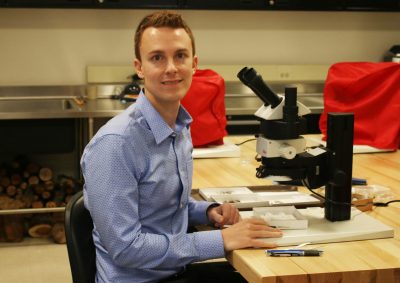
Archaeological studies stand in the crossroads of past and present, seeking answers from history for modern issues and relying on local perspectives to supplement solutions.
An archaeologist can only do so much with researching and publishing information. To make real change, archaeologists require collaborations with policymakers and local residents in the regions being studied.
“I can come up with big-picture lessons, but what I don’t know how to do is policy,” said John Marston, an archaeology professor at Boston University. “What I really need is collaboration with people who do land-use policy and agricultural policy. That’s the kind of collaboration I want to do more of going forward.”
Marston, a professor of archaeology and anthropology, gave a seminar in the College of Arts and Sciences Monday about agricultural sustainability and climate-change adaptation in ancient Anatolia, or present-day Turkey. He specializes in environmental archaeology, sustainability, Mediterranean and Near-Eastern archaeology and has worked at BU since 2012.
“Archaeology is the place where we see this primary scientific evidence of people in the past, and it lets us look at aspects of people’s daily lives that they didn’t bother to write down,” he said. “That’s why I think it’s really powerful.”
Monday’s presentation was an overview of much of his research on ancient Anatolia, and touched briefly on several specific points from larger research projects. The data from the seminar was derived from Marston’s study of Gordion, near modern-day Ankara, which was once the capital of the ancient empire of Phrygia.
Marston’s research aimed to discover the catalysts for agricultural and lifestyle changes in the region of Gordion, and hypothesized that most major changes were inspired by environmental and climatic changes.
“[Gordion is] a place that’s in a marginal environment for agriculture … yet people have lived there, farming, for 10,000 years,” Marston said. “The question is: why.”
That “why” is the driving force behind much of Marston’s research in Gordion, uncovering archaeological practices from the region by studying wood and charcoal remains and charred seeds unearthed from old tombs and burial grounds in the region. The data gathered from these remains was also presented on Monday.
Marston has studied agriculture and environment in ancient Gordion for over 10 years, since his graduate dissertation in 2002, and often returns to the region because of the data set it provides.
The archaeological findings at Gordion focused on the daily habits of ancient people, like cooking or cattle raising. Researchers like Marston use the studies to develop a stronger understanding of the connection between economic and agricultural practices and the environment and climate.
“Eventually, things fall apart,” Marston said. Researchers then, he said, “try to understand if environment played a role in those processes, or was it a case where someone conquered them?”
Marston’s research showed that practices used in ancient Gordion had a “long-term risk” on the environment, and yielded only “short-term profit.” This included cattle overgrazing and other overuses of natural resources.
Continuing research has become difficult, according to Marston. Just as ancient Gordion politics influence agricultural practices, the current political climate in Turkey impairs foreign research, including most of Marston’s projects.
This becomes especially difficult with implementing archaeological findings. Marston said that to implement any policies regarding his information, he requires help from policymakers within Turkey.
“Turkey has been a big problem to work in recently… they have become less interested in working with Americans,” Marston said. “It’s a shame.”
Some of Marston’s findings, including those presented on Monday, are set to be published in early 2017 as part of a book to be titled “Agricultural Sustainability and Environmental Change at Ancient Gordion,” as well as in the UK-based archaeological journal “Antiquity.”
Moving forward with his research, Marston said he focuses on studying herding patterns and how ancient and current economic and political and climatic changes influence the environment.
He also seeks to find ways to apply his findings more broadly, looking into the future and applying it to modern-day sustainability practices.
“I study the past, kind of the ancient past — and the last people who lived at the site of Gordion lived there in 1300 A.D. — but there are people who live there today,” Marston said. “You can’t help but watch the people who are around you … and I’m always struck by how closely some of the parallels we see in the past show up in the present.”


























































































































